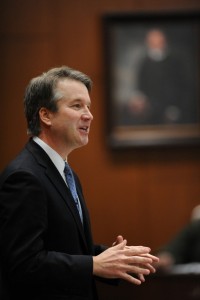Judge Brett Kavanaugh Calls for “Rules of the Road” for Separation of Powers Issues

So Dez Bryant of the Dallas Cowboys leaps for a pass as the playoff game with the Green Bay Packers is about to end. He comes down with ball on the one-yard line. Or does he? Or course, you know the answer—he doesn’t, the referees rule, a call that is hotly debated nationwide (and helps the Packers to victory in the Jan. 11 NFL playoff game).
The referee’s call required making a decision on the spot under great pressure and scrutiny. But to Judge Brett M. Kavanaugh of the U.S. Court of Appeals for the D. C. Circuit, a big reason the call was made in a way that stood up to later scrutiny was that the rules for deciding what was a legitimate catch were established ahead of time, with thought and clarity.
And that is, in substance, much of the message Kavanaugh delivered in the 2015 Hallows Lecture at Marquette University Law School on Tuesday. The lecture, titled “Separation of Powers Controversies in the Bush and Obama Administrations: A View from the Trenches,” examined five different policy areas where controversies over separation of powers at the top of the federal government have arisen in recent years. In all five areas, Kavanaugh said, it pays off when “the rules of the road” are developed before a crisis comes.

